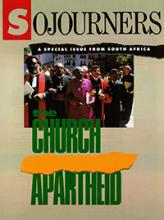South Africa. Just to say the name conjures up vivid images and strong feelings. It is a land of such pain and promise. And yet one has to wonder if South Africa is really so unique. Or is this tortured country a stark and illuminating parable of the rest of the world—a place where the issues, divisions, and critical choices facing us all are displayed in sharp relief?
For years we had hoped and prayed to go to South Africa, but we couldn't find a way. Then last spring, unexpectedly, a way opened up for us.
We went to South Africa at the long-standing invitation of Allan Boesak. We were hosted throughout the country principally by the country's black church leadership. That perspective is therefore strongly reflected in these pages.
The issues at stake in South Africa are quite simple and at the same time very complicated. We recognize that to write about them is a risky thing. Our 40-day sojourn had both the personally transforming power of an in-depth experience and all the limitations of a brief stay. While we were treated as friends, we remain outsiders like anyone who does not walk in the shoes of those who must carry on the struggle every day.
Our days were full, intense, and rich in both the breadth and depth of contact with people and events—a rare opportunity. Yet the report we offer is just that—a report on what we saw, heard, did, and felt-and cannot pretend to be a comprehensive analysis. The church leaders themselves, interviewed in depth on these pages, provide the best background, analysis, and vision for the future.
Read the Full Article
